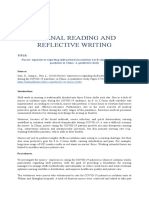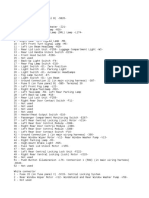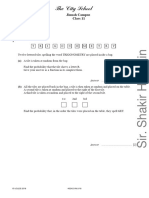0 ratings0% found this document useful (0 votes)
291 viewsTFN Trans 1
TFN Trans 1
Uploaded by
Chilled Moo MooThe document discusses the theoretical foundations of nursing. It defines key concepts like theory, components of a theory, and paradigm. Nursing theory guides practice by organizing patient data, understanding patients, analyzing data, and evaluating outcomes. The study of theory must be rooted in everyday nursing practice. Nursing's domain centers on the relationships between person, health, environment, and nursing. Current trends in medical science, education, research, and technology influence the ongoing development of nursing theory.
Copyright:
© All Rights Reserved
Available Formats
Download as DOCX, PDF, TXT or read online from Scribd
TFN Trans 1
TFN Trans 1
Uploaded by
Chilled Moo Moo0 ratings0% found this document useful (0 votes)
291 views2 pagesThe document discusses the theoretical foundations of nursing. It defines key concepts like theory, components of a theory, and paradigm. Nursing theory guides practice by organizing patient data, understanding patients, analyzing data, and evaluating outcomes. The study of theory must be rooted in everyday nursing practice. Nursing's domain centers on the relationships between person, health, environment, and nursing. Current trends in medical science, education, research, and technology influence the ongoing development of nursing theory.
Original Title
TFN TRANS 1
Copyright
© © All Rights Reserved
Available Formats
DOCX, PDF, TXT or read online from Scribd
Share this document
Did you find this document useful?
Is this content inappropriate?
The document discusses the theoretical foundations of nursing. It defines key concepts like theory, components of a theory, and paradigm. Nursing theory guides practice by organizing patient data, understanding patients, analyzing data, and evaluating outcomes. The study of theory must be rooted in everyday nursing practice. Nursing's domain centers on the relationships between person, health, environment, and nursing. Current trends in medical science, education, research, and technology influence the ongoing development of nursing theory.
Copyright:
© All Rights Reserved
Available Formats
Download as DOCX, PDF, TXT or read online from Scribd
Download as docx, pdf, or txt
0 ratings0% found this document useful (0 votes)
291 views2 pagesTFN Trans 1
TFN Trans 1
Uploaded by
Chilled Moo MooThe document discusses the theoretical foundations of nursing. It defines key concepts like theory, components of a theory, and paradigm. Nursing theory guides practice by organizing patient data, understanding patients, analyzing data, and evaluating outcomes. The study of theory must be rooted in everyday nursing practice. Nursing's domain centers on the relationships between person, health, environment, and nursing. Current trends in medical science, education, research, and technology influence the ongoing development of nursing theory.
Copyright:
© All Rights Reserved
Available Formats
Download as DOCX, PDF, TXT or read online from Scribd
Download as docx, pdf, or txt
You are on page 1of 2
THEORETICAL FOUNDATIONS IN NURSING
Samantha Louise C. Sunglao
THEORY - a set of concepts, definitions,
relationships, and assumptions that
project a systematic view of phenomena. WHY DO WE STUDY NURSING:
- May consist of one or more ● Everyday practice enriches theory.
relatively specific and concrete ● Both practice and theory are
concepts and propositions that guided by values and beliefs.
purport to account for, or organize ● Theory helps reframe our thinking
some phenomenon (Barnum, about nursing.
1988). ● Theory guides the use of ideas
and techniques.
COMPONENTS OF A THEORY: ● Theory can close the gap between
● CONCEPTS - ideas and mental theory and research.
images that help describe ● To envision potentialities (Gordon,
phenomena (Alligood and Parker, and Jester, 2001).
Marriner-Tomey, 2002).
● DEFINITIONS - convey the “THE STUDY AND USE OF NURSING
general meaning of the concepts. THEORY IN NURSING PRACTICE MUST
● Assumptions - statements that HAVE ROOTS IN THE EVERYDAY
describe concepts. PRACTICE OF NURSES (Gordon,
● Phenomenon - aspect of reality Parker, and Jester, 2001)”.
that can be consciously sensed or
experienced (Meleis, 1997).
USING THEORY IN EVERYDAY
PARADIGM - a model that explains the PRACTICE (NURSE PRACTITIONER):
linkages of science, philosophy, and ● Organize patient data.
theory accepted and applied by the ● Understand patient data.
discipline (Alligood and Marriner-Tomey, ● Analyze patient data.
2002). ● Make decisions about nursing
interventions.
DOMAIN - this is defined as the view or ● Plan patient care.
perspective of the discipline. ● Predict outcomes of care.
- Contains the subject, central ● Evaluate the patient outcomes
concepts, values and beliefs, (Alligood, 2001).
phenomena or interests, and the
central problems of the discipline. USING THE6ORY IN EVERYDAY
PRACTICE (STUDENT NURSE):
HOW DOES DOMAIN RELATE TO ● Ask yourself what the nature of
NURSING THEORY: knowledge is needed for the
- Nursing has identified its domain in practice of nursing.
a paradigm that includes for ● Ask yourself what it means to
linkages: practice nursing.
1. Person / Client
2. Health NON-NURSING THEORIES:
3. Environment ● Systems theory
4. Nursing ● Basic human needs theory
● Health and wellness models
PURPOSES OF NURSING THEORY: ● Stress and adaptation
● It guides nursing practice and ● Developmental theories
generates knowledge. ● Psychological theories
● It helps describe or explain
nursing.
● Enables nurses to know WHAT
and WHY they are doing practices.
LINK BETWEEN NURSING THEORY
AND RESEARCH PROCESS:
● The theory provides direction for
nursing research.
● Relationships of components in a
theory help drive the research
questions for understanding
nursing.
● Chinn and Kramer (2004), indicate
a spiral relationship between the
two.
CURRENT TRENDS THAT INFLUENCE
NURSING THEORY:
● Medical sciences
● Nursing education
● Professional nursing organizations
● Evolving research approaches
● Consumer demands
● Technologies
You might also like
- Case Study FinalDocument8 pagesCase Study FinalMargarita Limon BalunesNo ratings yet
- Nurses Leading Primary Health Care Directions and Options: Dr. Araceli MaglayaDocument26 pagesNurses Leading Primary Health Care Directions and Options: Dr. Araceli MaglayaHero Mondares100% (1)
- Theoretical Foundations in Nursing First Semester SY 2021 - 2022 Dr. Elena M. ValdezDocument36 pagesTheoretical Foundations in Nursing First Semester SY 2021 - 2022 Dr. Elena M. ValdezRednax 0912No ratings yet
- Nursing Theory Martha RogersDocument10 pagesNursing Theory Martha RogersZhij ConstanteNo ratings yet
- Resetting Your Hosts File - Ubisoft SupportDocument2 pagesResetting Your Hosts File - Ubisoft SupportblastoyNo ratings yet
- Carolyn Wiener & Marilyn J. Dodd: (Theory of Illness Trajectory)Document11 pagesCarolyn Wiener & Marilyn J. Dodd: (Theory of Illness Trajectory)ching chong100% (1)
- Florence Nightingale'S Environmental TheoryDocument16 pagesFlorence Nightingale'S Environmental TheoryZAY EMNo ratings yet
- TFN ReviewerDocument22 pagesTFN ReviewerG4 AMOYO ANGELICA NICOLENo ratings yet
- SCRIPT (2) With ExplanationsDocument4 pagesSCRIPT (2) With ExplanationsDomingo, Viella Clarisse S.No ratings yet
- Home Visit PDFDocument4 pagesHome Visit PDFHannahleth GorzonNo ratings yet
- Obtaing Subjective & Objective Data On Assessing Breast and Lymphatic SystemDocument8 pagesObtaing Subjective & Objective Data On Assessing Breast and Lymphatic SystemKathlyne Jhayne100% (1)
- Nursing Interview Guide - HA - VIOSDocument9 pagesNursing Interview Guide - HA - VIOSIra Velle ViosNo ratings yet
- Session #19 SAS - TFNDocument6 pagesSession #19 SAS - TFNKristina CassandraNo ratings yet
- Lecture - Chapter 2Document13 pagesLecture - Chapter 2Lawrence Ryan DaugNo ratings yet
- Nursing TheoriesDocument83 pagesNursing TheoriesIvan OlivaNo ratings yet
- Theories and Conceptual Models in The Philippines SettingDocument2 pagesTheories and Conceptual Models in The Philippines SettingMary Jane Barlas RoseNo ratings yet
- Virginia Henderson "The 14 Basic Human Needs": ObjectivesDocument7 pagesVirginia Henderson "The 14 Basic Human Needs": ObjectivesKhycelee June BaseaNo ratings yet
- TFN Reviewer Lecture Notes 1Document7 pagesTFN Reviewer Lecture Notes 1air benderNo ratings yet
- 10 Right To Refuse Participation in Medical ResearchDocument4 pages10 Right To Refuse Participation in Medical ResearchShiela Ocho100% (1)
- KarimarpptDocument20 pagesKarimarpptGreg Wiggins100% (2)
- TFN Prelims ReviewerDocument6 pagesTFN Prelims ReviewerKeyla PedrosaNo ratings yet
- TFN Final ExamDocument2 pagesTFN Final ExamJamoi Ray VedastoNo ratings yet
- Local Theories and Their WorksDocument21 pagesLocal Theories and Their WorksSheen CatayongNo ratings yet
- Journal Reading and Reflective Writing: TABERNA, Catherine T. BSN 4-2 (G4)Document3 pagesJournal Reading and Reflective Writing: TABERNA, Catherine T. BSN 4-2 (G4)aaron tabernaNo ratings yet
- Script For TSB GRDDocument9 pagesScript For TSB GRDJuvel OrquinazaNo ratings yet
- Historical MethodDocument33 pagesHistorical MethodSharmaine BeranNo ratings yet
- Pharma OutlineDocument2 pagesPharma OutlineHassen ZabalaNo ratings yet
- Local Theories Abaquin and LaurenteDocument27 pagesLocal Theories Abaquin and LaurenteGlebin ArguezaNo ratings yet
- History of Nursing in The Philippines BY JAY LAPAZ ANDRES, RNDocument4 pagesHistory of Nursing in The Philippines BY JAY LAPAZ ANDRES, RNJAY LAPAZ ANDRES, RN, BSN, MAN (C), MAEd.. (C)100% (1)
- Phillipine Nurses Bill of RightsDocument2 pagesPhillipine Nurses Bill of RightsRenea Joy ArruejoNo ratings yet
- Health Assessment: An: Diana Rose D. Emerenciana, RN., ManDocument72 pagesHealth Assessment: An: Diana Rose D. Emerenciana, RN., ManSM CervantesNo ratings yet
- Olfu Vision Olfu Mission Olfu Core Values: Health EducationDocument5 pagesOlfu Vision Olfu Mission Olfu Core Values: Health EducationChelsea JimenezNo ratings yet
- Evolution of The Nursing ProfessionDocument1 pageEvolution of The Nursing ProfessionDee BabieNo ratings yet
- TFN MidtermDocument16 pagesTFN MidtermEhm Margreth CabiscuelasNo ratings yet
- NCM100 NotesDocument3 pagesNCM100 Noteserika sabelNo ratings yet
- Asessment Diagnosis Planning Intervention Rationale EvaluationDocument1 pageAsessment Diagnosis Planning Intervention Rationale EvaluationChelsea Mae Bagalay GonzalesNo ratings yet
- Let's Check - Divinagracia N AgravanteDocument2 pagesLet's Check - Divinagracia N AgravanteGladys YaresNo ratings yet
- TFN Battery Exam ReviewerDocument28 pagesTFN Battery Exam ReviewerSilin MacarubboNo ratings yet
- Pb-Research-1 1 EditedDocument20 pagesPb-Research-1 1 EditedDianne Mae DagaNo ratings yet
- CBG RetdemDocument7 pagesCBG Retdemadd.bdrcNo ratings yet
- Definition of Term1Document4 pagesDefinition of Term1Kurtt Evan ValinoNo ratings yet
- Carbohydrate-Related Diseases Term PaperDocument5 pagesCarbohydrate-Related Diseases Term Paperheiress comiaNo ratings yet
- NCM 104-Community Health Nursing: Prepared By: Ezra Angeli C. Joaquin, RNDocument13 pagesNCM 104-Community Health Nursing: Prepared By: Ezra Angeli C. Joaquin, RNRaRe TVNo ratings yet
- Marilyn Ray Career History Theory of Bureaucratic Caring Powerpoint 2013 PDFDocument143 pagesMarilyn Ray Career History Theory of Bureaucratic Caring Powerpoint 2013 PDFVinz TombocNo ratings yet
- LPU Prayer - July 2014Document11 pagesLPU Prayer - July 2014Leonila AdarloNo ratings yet
- TFN Reviewer-Midterm ExaminationDocument11 pagesTFN Reviewer-Midterm Examinationmaria jonesNo ratings yet
- Cecilia Laurente Theory of Nursing Practice and CareerDocument2 pagesCecilia Laurente Theory of Nursing Practice and CareerJammel Dayuday100% (3)
- Sbar Template Staff To StaffDocument2 pagesSbar Template Staff To Staffrafikakurniati6100% (2)
- TFN 1st Prelim HO 2015Document4 pagesTFN 1st Prelim HO 2015teabagmanNo ratings yet
- Dr. Carmelita Divinagracia 1Document9 pagesDr. Carmelita Divinagracia 1TRAZZY JEZRYL LASALA PLAZANo ratings yet
- Context-Environment To Which Nursing Act Takes Place Content - Subject of Theory Process - Method by Which Nurse Acts in Nursing Theory NursingDocument22 pagesContext-Environment To Which Nursing Act Takes Place Content - Subject of Theory Process - Method by Which Nurse Acts in Nursing Theory NursingShyenNo ratings yet
- Nueva Ecija Doctors Hospital PracticumDocument10 pagesNueva Ecija Doctors Hospital PracticumsoftenNo ratings yet
- The Health Education Process Week 1Document16 pagesThe Health Education Process Week 1RONALD SARANo ratings yet
- TFNDocument27 pagesTFNim. EliasNo ratings yet
- Madeleine Leininger: (Transcultural Nursing Theory)Document22 pagesMadeleine Leininger: (Transcultural Nursing Theory)Arah Lyn ApiagNo ratings yet
- Sister Letty G. KuanDocument2 pagesSister Letty G. KuanDyan Emorocketeer50% (2)
- Nursing Informatics in CanadaDocument33 pagesNursing Informatics in CanadaKenNo ratings yet
- Health Teaching Plan AMLDocument2 pagesHealth Teaching Plan AMLInah Floresta BesasNo ratings yet
- Script RD2Document4 pagesScript RD2Andro EstalNo ratings yet
- The Ride of Your Life: What I Learned about God, Love, and Adventure by Teaching My Son to Ride a BikeFrom EverandThe Ride of Your Life: What I Learned about God, Love, and Adventure by Teaching My Son to Ride a BikeRating: 4.5 out of 5 stars4.5/5 (2)
- Theory in NursingDocument27 pagesTheory in Nursingthe lousy donutNo ratings yet
- CPE199 Chapter 5Document3 pagesCPE199 Chapter 5???No ratings yet
- The Thive Story AusabelDocument7 pagesThe Thive Story AusabelYash RajNo ratings yet
- Cuke4ninja CucumberDocument128 pagesCuke4ninja Cucumbermahi_dNo ratings yet
- Relationship of Customer Satisfaction and Customer Loyalty With Moderation of Switching CostDocument8 pagesRelationship of Customer Satisfaction and Customer Loyalty With Moderation of Switching CostAnonymous FnXzzyWDNo ratings yet
- KAI Expense Sheet Feb'24Document1 pageKAI Expense Sheet Feb'24muhammad majidNo ratings yet
- Patterns & Themes From Data GatheredDocument44 pagesPatterns & Themes From Data GatheredLeah San DiegoNo ratings yet
- Software Engineering and Project Management Module 2Document8 pagesSoftware Engineering and Project Management Module 2veeramuralitNo ratings yet
- Earth Pressure PDFDocument52 pagesEarth Pressure PDFNIKHIL BANDWALNo ratings yet
- ILMPDocument1 pageILMPJudy Lyn MahusayNo ratings yet
- TASK1Document4 pagesTASK1Tâm Nguyễn ThiệnNo ratings yet
- Course Plan: Lyceum-Northwestern University Urdaneta CampusDocument3 pagesCourse Plan: Lyceum-Northwestern University Urdaneta CampusJohnson FernandezNo ratings yet
- Intralox (Eng)Document37 pagesIntralox (Eng)Angel David Osorio RiveroNo ratings yet
- Hot Flushes in Breast Cancer Patients Treatment by Acupuncture and Dietary ModificationDocument10 pagesHot Flushes in Breast Cancer Patients Treatment by Acupuncture and Dietary ModificationLuís DinisNo ratings yet
- Worksheet Working With SourcesDocument4 pagesWorksheet Working With SourcesZubair MadniNo ratings yet
- CollegeDocument24 pagesCollegeAmrita JaiswalNo ratings yet
- Exlime 1946 MSDSDocument2 pagesExlime 1946 MSDSMurtaza SherwaniNo ratings yet
- Group 3 - ChachaDocument20 pagesGroup 3 - ChachaNikelkel ShrimpNo ratings yet
- Pin BCM 1Document3 pagesPin BCM 1Omega PrimeNo ratings yet
- PRIMM Replit May 2022Document27 pagesPRIMM Replit May 2022Ben HodsonNo ratings yet
- MartensDocument2 pagesMartensSara-Ann BermontNo ratings yet
- Top 50 Project Manager Interview Questions & Answers - Invensis LearningDocument16 pagesTop 50 Project Manager Interview Questions & Answers - Invensis LearningClyde KuraidoNo ratings yet
- Impossible Chocolate Flan Cake - Kawaling PinoyDocument2 pagesImpossible Chocolate Flan Cake - Kawaling PinoyArdm24No ratings yet
- Multiple Emulsion ReviewDocument11 pagesMultiple Emulsion ReviewverygoodbrotherNo ratings yet
- ProbabilityDocument10 pagesProbabilityAbhishek ThadhaniNo ratings yet
- Wireless: CCNA Exploration Semester 3Document39 pagesWireless: CCNA Exploration Semester 3adityanandwaniNo ratings yet
- Reciprocante Compresor IrDocument20 pagesReciprocante Compresor IrJose MontielNo ratings yet
- Poem The Way Things Are N RainDocument2 pagesPoem The Way Things Are N RainUnknownNo ratings yet
- Geological Survey of Great Britain - L The Country Around Holmfirth and GlossopDocument233 pagesGeological Survey of Great Britain - L The Country Around Holmfirth and GlossopCraig BurtonNo ratings yet
- Nature and Scope of Operations ManagementDocument2 pagesNature and Scope of Operations ManagementSathya GaneshNo ratings yet

























































































